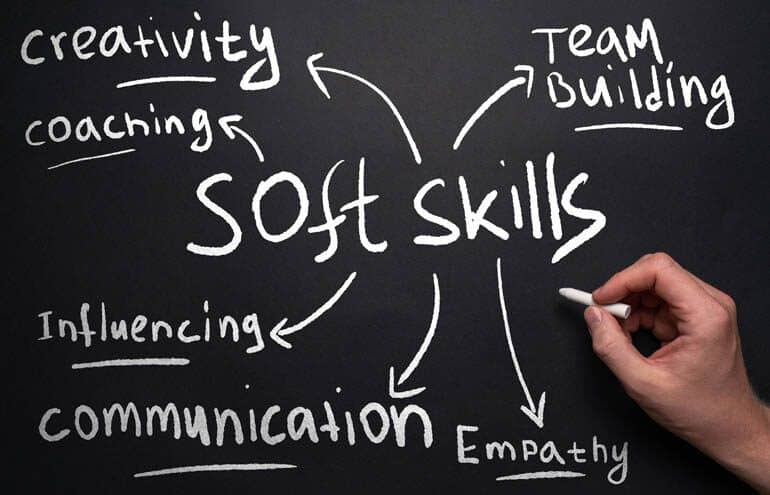Soft skills are perhaps your most important “intangible assets.” But before you hurl yourself into the hacks sprinkled across the web, we have to talk about the most important lawyer soft skill of all.

Table of contents
- You Can’t Hack Soft Skills
- Soft Skills Aren’t a Checklist, They Are Character Traits
- The Business Problem Soft Skills Address
- The Best Character Traits — the Desired Lawyer Interpersonal Skills — Are More Symptoms than Solutions
- How Do You Develop Soft Skills If Developing Soft Skills Aren’t Really a Thing?
- The List of “New” Soft Skills Keeps Growing and Changing
- But Classics Like Empathy Still Matter
- The Most Important Lawyer Soft Skill of All
- Speaking of Skills: Are You Working on Your “Fear of Mingling”?
Google “soft skills” and watch your screen fill up with an infinite scroll of links from Forbes, Business Weekly, Indeed and other websites trying to capture your search with a bulleted list. The interest in soft skills is enormous, which is why you’re here, and I have to come clean and tell you our headline is a lie.
You Can’t Hack Soft Skills
Soft skills are valuable precisely because of their unhackability.
You’ve seen the lists. A bulleted outline of empathy, communication, teamwork, problem-solving, time management, critical thinking, decision-making, dependability, leadership and integrity. So clearly defined. So accessible. But lists like this make it seem like you can install career attributes the same way you install apps on your phone. That would be great but, unfortunately, there are no shortcuts to acquiring intangible traits. You have to build them from the ground up.
Soft Skills Aren’t a Checklist, They Are Character Traits
The poorly named soft skills or “intangible professional assets” are more like territories than sharply defined capabilities. Work ethic, dependability and the ability to work as part of a team are all so closely related it’s hard to pry them apart. How can you have a solid work ethic if you aren’t dependable? How can anyone depend on you if you can’t take a role in a team? What leader can’t solve problems, adapt to changes or resolve conflicts?
But it’s not like that. Soft skills are nested. They’re interrelated. They’re more like colors bleeding into each other. You can’t really list one without mentioning another. It’s like trying to talk about words without using the word “word.”
The Business Problem Soft Skills Address
The business use case is nebulous and fuzzy, but it’s pretty much this:
How can we make sure the people we employ aren’t rampaging miscreants and can actually get stuff done without murdering an intern or getting themselves thrown off the mezzanine?
The solution is to hire people who embody the classic soft skills. But how do you, as a potential summer candidate or just one of the attorneys in litigation who wants to level up, embody these talents without coming off like a maniac?
Law firms can also play a role in enhancing essential soft skills with their legal professionals with onsite training.
The Best Character Traits — the Desired Lawyer Interpersonal Skills — Are More Symptoms than Solutions
Take one of the truly classic lawyer soft skills: active listening.
Active listening is a nearly magical talent, critical for every skill set and workplace situation. If you don’t listen well, you can’t manage people, resolve conflicts and take or give instructions. But advice from major media doesn’t exactly help: “face the speaker, maintain eye contact and nod to show you are engaged, smile and use other facial expressions, interject small verbal comments like ‘yes,’ and ‘uh huh.’”
This sounds less like sound career advice and more like instructions for visiting aliens or ambitious psychopaths.
Good listening skills happen naturally if you cultivate a deeper quality: You have to want to listen. If you have the desire to understand the person you’re listening to, then these valuable professional mannerisms will manifest naturally. Or at least your versions of these traits.
Your variants are more like adjacent behaviors. Maybe you don’t look the speaker in the eye. Maybe you go “Columbo.” But that won’t matter if you want to know what they’re saying. That’s at the heart of good listening, and it will be evident to anyone that you’re engaged.
How Do You Develop Soft Skills If Developing Soft Skills Aren’t Really a Thing?

Well, OK, soft skills are a thing.
They’re just not a thing you can grab off the shelf. If you want to develop them, you have to understand the personal faculty in which each of the soft skills is rooted. The classic soft skills are manifestations of deeper character and are interwoven to the point of entanglement:
- Critical thinking is a manifestation of intellectual curiosity and a habit of self-education.
- Problem-solving comes from exactly the same place but is interdependent with critical thinking.
- Work ethic is evidence of solid virtues, probably developed since childhood, and isn’t so much a skill as it is a sign of good character.
- Time management comes from the same place, though it is dependent on a good work ethic, critical thinking and problem-solving.
- Communication skills are closest to a fully acquired skillset, as the desire to be understood may be the basis of good communication, but how communication works is a science one needs to learn.
The List of “New” Soft Skills Keeps Growing and Changing
The remote work revolution has thrown everything out of whack, from the definition of Friday casual (less camera-ready?) to the prioritized values of soft skills. In addition to the classics listed previously, we now have soft skills directly related to the mercurial nature of an untethered workforce.
One exhaustive collection of new soft skills lists flamboyance, originality and creativity, which seem like the same things. Here are a couple of other “new” soft skills for remote worker culture:
Flexibility is listed on many important lists, right at the top.
In a big firm, flexibility may mean the ability to pivot seamlessly from one case to another. I would like to recast this, however, not as being flexible, but as being adaptive. It’s great that you can swerve from one project to another, but it is critical that you adapt your talents and your hard skills to the new work.
Judgment and complex decision-making are there, too.
These depend on another faculty, discernment, which is akin to wisdom and the product of experience and, often, failure. Please don’t Google this — the resulting long list of second-rate new-age discussions won’t help. Here, we’re talking about judgment’s use in problem-solving, not its role on TikTok. You can’t properly judge something’s validity or solve a complex problem if you can’t discern the validity of its components.
In interpersonal and one-on-one situations, especially in conflict resolution, discernment helps you cut through the surface noise so you can understand what’s really bothering someone.
But Classics Like Empathy Still Matter
This brings us to empathy, one of the least understood but most critical of all lawyer soft skills. So many of the other traits depend on empathy. Ethical awareness, conflict resolution, listening, communication, diversity awareness, and even discernment are all developed from empathy. You must be able to put yourself in someone else’s place to understand them. You must understand them to listen well or truly communicate — and even work with them in a team.
Empathy is foundational for good leadership. You have to truly understand where each member of your team is coming from, to have gone through what they’re going through, and to manage them well.
But there is one intangible assets rule that supports and governs all others.
The Most Important Lawyer Soft Skill of All
Lawyer, Know Thyself
Before you hurl yourself into the soft skill hacks sprinkled across internet overuse, we have to talk about the most important lawyer soft skill of all. This character trait is the bedrock of all intangible career attributes. Know yourself.
It doesn’t mean your ability to rattle off the bullet points of your last five years in the field. Knowing yourself means having a deep and true understanding of who you are.
You need to spend time in quiet reflection, away from screens, away from the blinking signals on your laptop, and away from people. You must find the time to still yourself, take a breath, and peer over the edge into the murky depths of your inner self.
It doesn’t hurt to grab a book of philosophy off the shelf, but you don’t really need it for this. You just need the courage to be quiet and let your deepest self rise up from the wellspring of your mind and be recognized.
Poet Eric Overby wrote that trying to know yourself is like “trying to see your eyes”:
If you want to see yourself, you need to create some space; you need a mirror. Stillness, mindfulness, meditation: these are the mirrors.
There’s no shortcut. Without a sense of self, without knowing who you are, without living in a well of earned truth, none of these soft skills will matter. The simplest method is to develop a practice of reflection. One easy way to do this is to recognize the value of boredom. If you take advantage of those moments when you have nothing to do, or when you can’t do anything more than stand in line at Aldi or wait for your dentist, then do yourself a favor. Keep your phone in your pocket. Don’t pick up Business Weekly (it’s three months out of date anyway). Just sit there. Your mind will do the rest.
Your unconscious will use this space to straighten the place up and clear the clutter and put old pointless thoughts in the trash or back on the shelf. It will Marie Kondo your conscious den to make room for those neglected truths waiting in the queue. It’s not all doom and gloom. Your unconscious is your greatest champion. It will happily highlight the brighter nuggets of your personality.
The result is a deeper confidence.
You will gain a sense not necessarily of direction, but of navigability. Maneuverability. You will develop and use a fine inner compass so that no matter the situation, no matter the department and no matter the project, you’ll never be lost.
Copyright © iStockPhoto.com

















